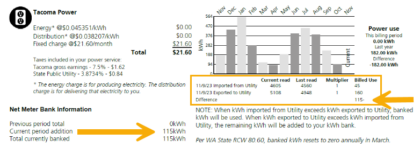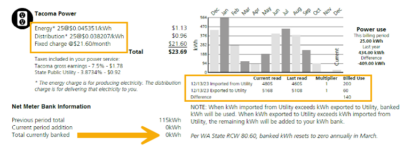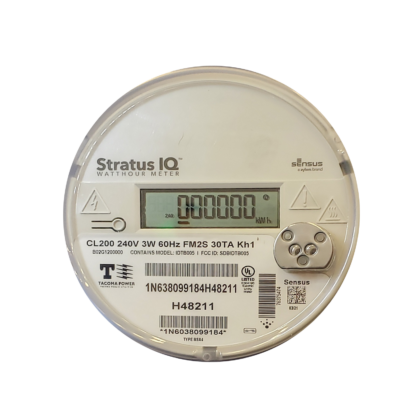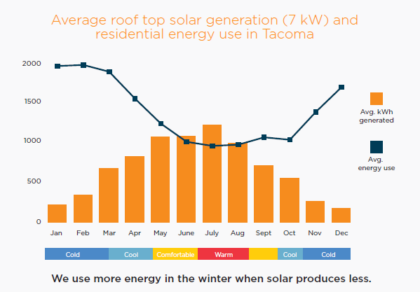Solar FAQs
Many customers choose to install their own electrical generating array of rooftop solar panels. Rooftop solar panels alone will not meet your electricity needs so you will still need to be connected to Tacoma Power through a “net metering” connection. Net metering involves the interconnection of electricity generating devices (i.e., solar panels) to the utility electric grid. Through the installation of an Advanced Meter that separately records energy delivered from energy consumed, net metered customers can purchase electricity from Tacoma Power when needed and send electricity generated by their system back onto the electric grid when they don’t have need for it. To help you better understand how this works, we have compiled a list of frequently asked questions below. Don’t see your question listed? Get in touch with us via email or call 253-502-8363.
Some customers are seeing advertisements on Facebook from companies claiming they are partnering with Tacoma Public Utilities to offer discounts on home solar installation. Tacoma Power does not partner with solar installation companies and does NOT currently have any program to help with the cost of solar installation.
- Net Metering Annual Reset – What you need to know.
-
What is the Net Meter Bank annual reset?
Each year, on March 31st, any unused net metering credits (Excess kWh) will expire and your Net Meter Bank will reset to zero. This is in accordance with Washington State Law RCW 80.60.030(5).
When does the reset happen?
The reset happens every year on March 31st. Your Net Metering Bank will reset, and you will immediately begin banking new excess kWh again.
Will the reset affect me?
-
- If you use your banked kWh before the March 31st billing date: No Impact
- If you have leftover kWh in your Net Meter Bank when your March bill is generated, those credits will expire.
Why does the reset happen?
This is a requirement under Washington State Law RCW 80.60.030(5). Utilities cannot indefinitely roll over excess credits.
Will I stop banking excess kWh after the reset?
No! Once your Net Meter Bank resets, you will immediately start banking new excess kWh you generate for the next 12 months.
I’m a part of the RESIP (incentive) program. Will this affect my payment?
No, the net metering reset is separate from the RESIP payments.
-
- Solar Billing Updates
-
What is changing and when?
Effective May 2024, net excess kilowatt hours (kWh) will be deposited into a “Net Metering Bank” to be applied against future power usage charges only. Excess kWh will no longer be applied to Fixed Charges or other Utility charges. It may take 1-2 bill cycles before you see the net metering bank on your bill.
Also, meter aggregation is now available, through enrollment only. If you want to move excess kWh from a solar account to an eligible non-solar account, you must enroll in meter aggregation (see “meter aggregation” below for more information).
What is Net Excess kWh?
Net excess kWh happens when the amount of kWh generated and sent to the Utility equals more than the amount of kWh used by the customer. These amounts are shown under the graph on the bill. They are calculated, and the result is shown on the line labeled “Difference.” A difference of a negative amount means there was a net excess amount for that bill cycle. That net excess amount will go into the Net Meter Bank for future use.

When the “Imported from Utility” (energy used) amount is more than the “Exported to Utility” (generated by customer), banked kWh will be pulled from the Net Meter Bank, when available, to offset the difference. The Net Meter Bank will display how many excess kilowatt hours (kWh) were banked during the bill cycle as well as the total banked amount.

After calculating the difference between the customer’s 200 kWh “Imported from Utility” and the 60 kWh “Exported to Utility,” the customer would normally be billed for the 140 kWh NET “Difference.” Instead, 115 kWh is removed from the Net Metering Bank and is subtracted from the 140 kWh, leaving only 25 kWh owing for the month. 200 Imported from Utility less 60 Exported to Utility equals 140 kWh NET consumption Less 115 Previously banked kWh —- 25 kWh left owing for that month’s bill.
What utility bill charges can I expect to pay?
Your power usage beyond your banked or solar-generated amount, as well as your Fixed Charges for power and charges for drinking water, solid waste, surface water, and wastewater will be billed during your normal billing cycle. You can pay these charges online using MyAccount or using one of our other many ways to pay.
What happens if my solar panels generate more power than my home/business uses?
If the solar panels on your home/business generate more power than what you use in your home/business during your full bill cycle, your Net Metering Bank will grow. You will see the Net Metering Bank represented on your bill.
When will I draw from my Net Metering Bank?
When your solar panels generate less power than you need during your full bill cycle, you will draw from the Net Metering Bank first before incurring additional charges.
How long does my Net Metering Bank last?
On March 31 of each calendar year, any remaining unused kWh accumulated will expire and the Net Metering Bank on your bill will automatically reset. See WA state net metering law RCW 80.60 for more information about this.
Can I use leftover kWh in my Net Metering Bank for another account (i.e., meter aggregation)?
Meter aggregation applies to a solar customer with multiple electric service meters at the same property. Meter aggregation is the billing process of moving excess banked kWh from a solar net metering account to an eligible non-solar account.
EXAMPLE of an ELIGIBLE meter aggregation: A customer with a non-solar house account and a separate account for their detached garage, where the solar is located. Enrolling in meter aggregation will allow for the net excess kWh to be moved to the house account each bill cycle. Without enrolling in meter aggregation, the net excess kWh will remain on the garage account and be subject to the March 31 reset.
EXAMPLE of NOT ELIGIBLE for meter aggregation: A customer with an account for their house and a separate account for their detached garage where BOTH of those accounts have solar.
- The net meter and aggregated meter must be on the same or a contiguous parcel.
- Both services must be in the same customer’s name.
- The aggregated meter cannot be another solar net meter. In other words, Tacoma Power cannot move banked solar kWh to another solar net metering account.
Net metering aggregation is a software billing function; It is not a physical connection of the meters. Therefore, a credit needs to be deposited into the Net Metering Bank on the current billing statement of the solar account before it can then be moved (aggregated) to another eligible account.
Aggregation requests will be reviewed based on WA state net metering law RCW 80.60.
You can access our Meter Aggregation Request Form here.
Can I opt-out of banking my kWh?
No. This change is being done to align Tacoma Power with RCW 80.60. It affects all solar customers and is not optional.
Can I apply my banked kWh toward my Fixed Charge?
No. This change is being done to align Tacoma Power with RCW 80.60. The banked kWh can only be applied toward consumption (“energy” and “distribution” kWh charges).
What happens to banked kWh if I move or close my account?
Any available banked kWh will be used when calculating the final bill. If any kWh remains in the bank after calculating the final bill, it will be removed and reset to zero. There is no additional compensation.
Why is this change taking place?
This change aligns Tacoma Power with WA state net metering law RCW 80.60.
Does this change affect my Washington State Renewable Energy System (RESIP) incentive?
Washington State RESIP incentives are not affected by the Tacoma Power billing change. RESIP incentives are calculated using annual solar production and are not connected to your Tacoma Power utility bill. For more information about the RESIP program, click here.
- Getting Started
-
Are rooftop solar panels a cost-effective choice?
Cost effective means different things to different people, but most hope that their rooftop solar panels will pay for themselves over time.
Will solar power lower my electric bill?
Solar power will reduce the energy you purchase from Tacoma Power during sunny times of the day and year. However, rooftop solar panels won’t help make your home more energy efficient. Before you look into buying rooftop solar panels to help you save money on your electricity bills, it’s a good idea to investigate how to improve your home’s energy efficiency. Tacoma Power offers heating and weatherization rebates and loans to help you cover the costs. Improving the energy efficiency of your home can help you use less electricity and lower your utility bills.
NOTE: At this time, Tacoma Power does not have incentives or programs to help with the cost of installation for solar panels.
What is Net Metering?
Net metering is the process of connecting electricity generating devices like solar panels to the utility’s electric grid. The State of Washington Chapter 80.60 RCW allows you to offset your electricity use with the electricity produced from your own solar (most common), wind, or other (renewable) power sources. When you use more electricity than you produce during a given billing cycle, you pay Tacoma Power. When your solar panels produce more electricity than you use, Tacoma Power will reduce your utility bill. Any excess electricity that you don’t use to lower your utility bill is banked for future utility bills.
By state law, your net metering credit resets to zero on March 31 of each year. We recommend you install rooftop solar panels that generate no more electricity than your average yearly use.
What does a typical set of rooftop solar panels cost?
The cost of a typical set or array of rooftop solar panels depends on the number of solar panels, other equipment such as inverters and batteries, and the installation and location of the panels. The price can range from $20,000 to over $40,000, so it’s important to get several bids from solar contractors.
- Installation & Operation Information
-
What should I consider before investing in rooftop solar panels?
Seek advice to help you make an educated choice before installing rooftop solar panels. As with any home improvement project, your ultimate success depends on the installer you choose. We strongly recommend that you work with a reputable solar installer who is licensed, bonded, and insured, and that you seek multiple bids. Washington Solar Energy Industries Associations can help you find an installer. It’s still a good idea to request references and check online reviews and comments. Other items to consider:
- The condition of your home and roof. When was the last time your roof was replaced or repaired? The method of mounting solar roof panels can impact roof warranties and home insurance policies.
- Maintenance. Rooftop solar panels require ongoing maintenance. Ask your solar installer about the manufacturer’s recommended maintenance schedule and take those costs into consideration when selecting your system.
- Panel location. It’s important that your rooftop solar panels receive the greatest amount of sunlight. Consider factors that will impact the sun’s ability to shine on the panels, including shade from obstructions such as trees, the angle of the panels, and the direction of the panels (western and southern exposures work best).
- Homeowner’s Association (HOA) rules. Your HOA rules may affect the rooftop solar panels you can select, buy, and install. Review your plans with your HOA before choosing, buying, and installing your rooftop solar panels.
How many rooftop solar panels should I install?
Three factors affect the size of your rooftop solar panels – your electricity use, space availability (1 kW of solar panels requires about 80 square feet of space), and your budget. The typical home in Tacoma Power’s service area uses about 12,000+ kWh each year. Ultimately, the contractor you select should help you size your array of rooftop solar panels.
Will I have electricity when there is no sunlight?
Your array of rooftop solar panels won’t provide power in the dark, but your home remains connected to Tacoma Power’s electric grid even with solar power. This ensures your home has reliable power when the electricity in your home is not powered by your rooftop solar panels.
Who should I contact if my rooftop solar panels are not operating correctly?
Your solar installation contractor is responsible for the performance of the array of rooftop solar panels that you purchase and can help you determine what actions you can take, and any parts and labor warranties, etc. Your solar installer should provide you with a comprehensive maintenance plan based on the manufacturer’s recommendations for the rooftop solar panels and other equipment you bought.
What if I think my solar panels are not producing power?
Check your monitoring equipment to see if your system is producing the expected amount of kWh. Please reach out to your solar installer for assistance with troubleshooting.
What if my bill is higher than expected?
If your bill is higher than expected, check your solar production monitoring equipment, app, or website to verify that your system is producing the expected amount of kWh. If there is an issue with your solar production, please reach out to your solar installer to troubleshoot your equipment. If there is not an issue with your solar production but you still have concerns about your bill, please reach out to our customer service department at 253.502.8600.
- Tacoma Power Grid Information
-
What must I do to connect my solar power system to the Tacoma Power grid?
Before installing your rooftop solar panels, your contractor will need to apply for an electrical permit from Tacoma Power. Also, ensure your contractor submits a Tacoma Power Solar Application and Interconnection Agreement online, and all the supporting documentation. Please note that as of March 6, 2023, we no longer require a solar production meter.
How does the Advanced Meter upgrade project impact solar panel installation?
If you are installing solar, an Advanced Meter is required. If you’re not already on a monthly bill cycle, you will be converted to a monthly bill cycle at the time of interconnection of your new solar array.
- Billing Information
-
Will I still get an electricity bill from Tacoma Public Utilities after my rooftop solar panels are installed and operating?
Yes, you will get an electricity bill from Tacoma Public Utilities as long as your home remains connected to the Tacoma Power grid.
Can I use Budget Billing with my solar power system?
Budget Billing is incompatible with solar net metering. Your Budget Billing will discontinue at the time of interconnection of your new solar array.
How do I read my new advanced electric meter?

Most solar customers have two of the electric meters pictured here, a Production Meter and a Net Meter.
The Production (or Generation) Meter measures the electricity generated by the solar panels, in kWh, before home consumption. This measurement can also be accomplished on a solar customer’s solar monitoring “app” or other customer-owned production monitoring equipment.
The Net Meter measures the amount of electricity sent from the house to Tacoma Power’s grid, and from Tacoma Power’s grid to the house. If excess electricity (electricity that cannot be used in the home at the time that it is produced) is sent to Tacoma Power’s grid, it will be measured on the Net Meter’s 2nd channel (the 2nd number to appear after the display shows “888888”). The Net Meter also measures electricity purchased from Tacoma Power, also in kWh. This is shown on the 1st channel of the Net Meter (the 1st number to appear after the display shows “888888”).
To determine your bill, the amount of electricity sent to Tacoma Power (“Exported to Utility” on your bill) is subtracted (or credited) from the amount of electricity purchased from Tacoma Power (“Imported from Utility” on your bill). The information shown on Production Meters is not used in calculating customer electricity bills. These amounts are shown under the graph on the bill. They are calculated, and the result is shown on the line labeled “Difference.” A difference of a negative amount means there was a net excess amount for that bill cycle. That net excess amount will go into the Net Meter Bank for future use.
There is no concern if you see 888888 on either of your meters. This is simply a check to ensure the display is functioning properly.
- State Renewable Energy System Incentive Program
-
From 2005 until 2017, Washington State offered incentives for renewable energy generated from registered renewable energy systems under the Renewable Energy Cost Recovery Incentive Program (RECRIP). In 2017, the legislature lowered incentive rates for renewable energy production in exchange for extending the program beyond 2020 under the Renewable Energy System Incentive Program (RESIP). Homeowners with solar electric systems registered with the WSU Energy Program prior to February 2019 will continue to receive incentives based on the program in which they are registered. Click here for more information on the Renewable Energy System Incentive Program.
Homeowners who did not have or did not register their systems with the WSU Energy Program prior to February 2019 are not eligible for state production incentives. However, customers who purchased their solar system after July 1, 2019, are eligible for a tax exemption on all sales tax paid on the purchase and installation of their solar system. They are also eligible for the Federal Investment Tax Credit (ITC).


